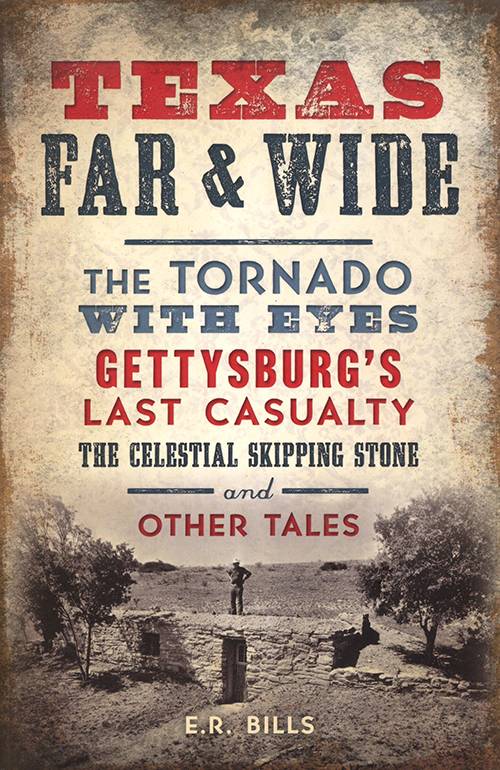Texas Truth

Texas Far and Wide: The Tornado with Eyes, Gettysburg's Last Casualty, the Celestial Skipping Stone and Other Tales
by E.R. Bills
Charleston: The History Press, 2017.
142 pp. $21.99 paper.
Reviewed by
Jaimie Haider
Former U.S. Speaker of the House Tip O’Neill is credited with reminding his colleagues that “all politics is local.” O’Neal implored his colleagues to both grapple with big ideas while also keeping sight of their constituents’ commonplace concerns. In Texas Far and Wide, E.R. Bills has produced a series of historical essays about Texas that are best described as local. While Bills’s selected topics often insert Texas into larger national and historical conversations, the author first and foremost describes the writing of Texas Far and Wide as an exploration of Texas itself. Bills says he used the writing process as an opportunity to “make [his] life less sedentary,” taking the opportunity to travel and learn more about his home state. In a series of twenty-five short essays, Bills invites his readers to learn more about Texas through his examinations of folk lore, exposés of small and large traumas, and highlights of little-known heroes. All the while, Bills provides space for lesser heard Texans to speak into the larger conversation about the state’s history.
While a particular argument doesn’t weave all of the essays together, the intentionality of Bills’s subject choices is plain to read. Bills’s subjects are diverse. In “First Fastest Man Alive,” Bills tells the story of Charley Paddock, a white man who overcame childhood health problems to become a WWI veteran, gold medal Olympian, and star collegiate debater before his untimely death while serving in the Marine Corps during WWII. Although Paddock overcame great odds to achieve his success, he had the fortune of being welcomed by every institution he encountered. In “Harvard of the West Mississippi” on the other hand, Bills explores the unlikely successes of the famed Great Debaters of Wiley College in Marshall, Texas. While the team had many achievements, Bills notes their consistent struggles against segregation, racist Pi Kappa Delta policies, and the “long-held myth” of black intellectual inferiority.
In other essays such as “Teenage Aviatrix” and “Patsy or Betsy, A Negro Woman,” Bills successfully uncovers lesser known topics of Texas history while naming the actors, acknowledging their accomplishments, and illuminating the injustices that affected their trajectories. Herein lies one of the quiet strengths of Bills’s monograph. Bills calls the leading and supporting actors of Texas history by name. Essays such as “Tornado With Eyes” take a nearly Biblical turn as Bills creates space to honor every victim of a 1987 tornado by both name and age. The names cover nearly a full page. These editorial choices make Bills’s essays feel local and personal, even when they touch upon grander narratives. Readers will feel like locals as they learn about the Lone Star State, and otherwise unnamed Texans will find their place in the annals of Texas history.
Reading Texas Far and Wide is a delight. E.R. Bills tells the stories of ordinary Texans as they encounter successes, tragedies, and mysteries. (Even native Texans may be surprised by the number of Texas UFO sightings Bills uncovers.) Bills succeeds in making these stories feel both local and historically significant, sometimes by connecting these histories to larger narratives and always by treating each subject with wonder and respect. This monograph is not without its issues or oversights. For instance, in “Gettysburg’s Last Casualty,” Bills does not apply the same sharp yet respectful criticism definitive of his monograph when discussing Texas veterans of the Civil War. In this essay, the most difficult questions— about how to respect local history while remaining critical of the confederacy—seem to remain unasked. Additionally, while the subjects of Bills’s histories are diverse, their identities are certainly not representative of the robust diversity of Texas. Texas cities such as Houston have been the centers of vibrant Asian-American and LGBTQ communities, for example, but these communities’ stories do not inform this monograph.
In the book’s brief preface, E.R. Bills argues that the world is “too much without” his readers as they settle into their own homes, warm on their couches. The author asks that his readership continue his work of exploration, setting out to learn more about their homes beyond their own property lines. The gaps in Bills’s subjects certainly invite readers to this opportunity, and the integrity and curiosity with which Bills treated each of his topics in Texas Far and Wide provides an excellent model.
Jaimie Haider has worked in higher education for nearly a decade. A student of history and native Texan, Jaimie reads Jimmy Carter books and chats up her husband and dog about politics over chips and guacamole while longing for the championship days of the Houston Rockets.
